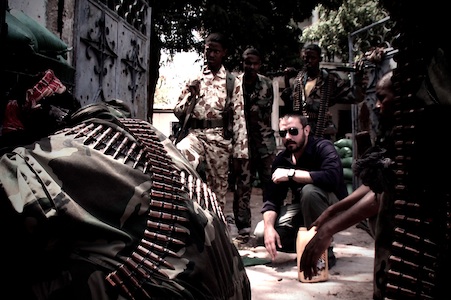In Park City, bumped off the waitlist for a screening about gritty urban tragedy that I woke up at 7:30 a.m. to make, I walk home via ski hills, not unhappily inhaling cold mountain air, slipping past parked SUVs and taking in the scent of money. I’m a regular at this festival, but the juxtapositions are always jarring—last night, I had a long talk with a leafleting communist promoting agenda films behind me in line, then emerged to the busload the ski-suited families en route to their two-thousand-a-night rentals. This year, the gap is even wider—Sundance’s radicalized, sobering Park City vs. the rest of a soberly religious Utah, for one—as both dramatic features and documentaries in particular have amped up their oppositional political angles. While films about extreme athletes, pornographers and muscled fugitives would eventually be on my agenda, in my first 18 hours at the festival, I watched films tackling such treacherous topics as America’s covert wars and escalating targeted assassination projects (Richard Rowley, Jeremy Scahill, David Riker’s noirishly narrated Dirty Wars), the relationship between a runaway branch of American evangelicals and growing hysteria over gays in Uganda (Roger Ross Williams’ expose God Loves Uganda) and the hard facts of third trimester abortions, told in the most nuanced, heartbreaking detail (Martha Shane and Lana Wilson’s After Tiller).
“When you are in the middle of a story it isn’t a story at all, but only a confusion,” Sarah Polley’s father is saying in The Stories We Tell, quoting Margaret Atwood, “…it’s only afterwards that it becomes anything like a story at all. When you are telling it….” Polley’s complicated treatment of her happy family’s past gives lie to the Anna Karenina principle; happy families are certainly not all alike, and the less said about the plot of this rich film—which has been circulating on the festival circuit and touched down here as well—the better for future viewers. But the Atwood quote at its core does offer convenient framing in a discussion about the role of storytelling and story presentation in our political present.

Most of the details of Scahill’s Dirty Wars, for instance, are certainly familiar to leftists, readers of The Nation and fans of Democracy Now radio/TV. But putting the story together at this particular moment, with the Oscar snub of Katherine Bigelow a fresh snowprint on the Hollywood psyche (was the debate over Bigelow’s seeming belief that torture actually works to produce credible information the reason?), the documentary gains another dimension. Scahill chases for years an enigmatic military presence in the Middle East who is killing innocent families without facing the slightest sanction. And after much continent hopping, dim-light interviewing and back-breaking, nail-biting war-zone labor, he finally nails the evil-deed-doers….only to find them celebrated on national TV. Yes, it is the same JSOC whose extra-legal assassinations are reconfigured as heroic labor on behalf of American security by none other than the Obama administration…And whose results are lionized in a major feature film. The finalized Scahill story was all in the timing; like the seventies political conspiracy dramas (and investigative stories) that preceded it, in the end, it’s the guileless American public—too in thrall to the volume of “official” storytelling to see the horrific truth hidden in plain sight—who is, in part, to blame.
Also hidden in plain sight: While Fox News puts a glossy, high-decibel spin on the right-wing, God Loves Uganda exposes the truly strange and lethal nature of evangelical America. Roger Ross Williams’ film fascinates largely for the way it turns the tables on the typical first-world/third-world relationship in filmmaking and viewing. It’s the Kansans who are strange and exotic, speaking in tongues and dancing to Christianized rock in church buildings, and the central African citizens (not politicians) who are largely sensible, going about their business in taxis and on farms until interrupted by insistently hand-holding Americans. A story of the rampant excesses allowed, even governmentally encouraged at times, in Christian-ideological “aid” to Africa—excesses that led to the death of a Ugandan LGBT activist and demonization of anyone befriending African lesbians and gays—the documentary opens the door on the altogether odd practices, habits, ideas of the American evangelicals adventure-tripping their way through various central African outposts converting ordinary people to bizarre U.S.-bred hatreds.

I’ve long been impressed by Sundance’s political bravery when it comes to documentary, and After Tiller, a well-crafted argument that left no stone unturned in its discussion of third-trimester abortions is one of the most courageous pieces of filmmaking and programming I’ve ever seen. It’s not only the women speaking about their difficult decisions to terminate their pregnancies at these late stages, but the doctors as well. There are only four remaining doctors who do this procedure, after the killing of Dr. George Tiller, and they face threats to their own lives nearly every day they continue working. But what the filmmakers produce from this awful scenario is a thorough picture of the grief, sadness and necessity of this work. The film takes the issue out of pulpit/talk show screaming-match format and engages viewers hearts and minds, reminding us why we need to make and watch documentary films at all.




